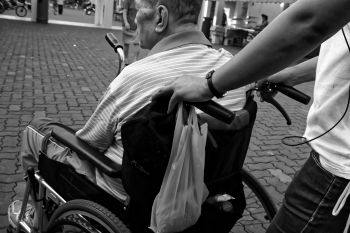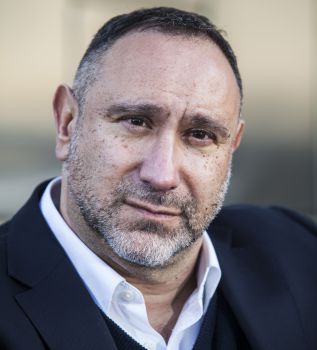Research news
Affirmative action needed to protect young carers’ human rights
By: Neil Vowles
Last updated: Wednesday, 25 September 2019


Professor Saul Becker, Provost and Deputy Vice-Chancellor

Feylyn Lewis
Academics want affirmative action for young carers and are calling for policies that go beyond simply levelling the playing field in a new study launched at the EU parliament today.
The new study, the largest ever of young carers across six European countries, warns that governments’ failure to take proactive action on behalf of young carers could be in breach of their human rights.
The Me-We project, which features academics from the University of Sussex, recommends a number of policy initiatives to more proactively support young carers including:
• Special measures such as additional time for young carers sitting exams that already exist for other groups.
• Develop psychological supervision in schools to support adolescent young carers in managing frustration, anger and other negative feelings raising from caregiving activities.
• Help develop flexible working conditions for young carers by providing incentives for employers who hire caregivers to work part-time hours via telework.
• Provide more training on how to identify and support young carers for professionals in a variety of sectors (including GPs).
Saul Becker, Professor of Social Work and Social Policy at the University of Sussex, said; “Young carers are a particularly vulnerable group and should be recognised as such. They should not only benefit from the universal implementation of their rights but be subject to additional and tailored policy and support measures with a scale and intensity that is proportionate to their level of disadvantage.
“International human rights law requires States to adopt affirmative actions in fulfilling their obligations to respect the equality principle. One could argue the lack of positive actions from States to support young carers is a failure to protect and promote these rights.”
The study also reveals several of the significant challenges that young carers in the UK face including:
Mental Health - 60% of UK young carers in the study reported mental health problems because of their caring. 30% of adolescent young carers have thought about hurting themselves. 12% have thought about hurting others (of these, 43% have thought of hurting the person they care for).
Physical health - 30% of adolescent young carers reported physical health problems due to their caring role.
Education - 41% of young carers reported experiencing difficulties in school due to their caring responsibilities. 22% experienced negative school performance and 37% had endured bullying, teasing, or being made fun of, due to caring.
Dr Feylyn Lewis, Research Fellow in the School of Education and Social Work at the University of Sussex, said: “As our study shows, young carers face enormous challenges when it comes to almost all aspects of their life including education and maintaining good physical and mental wellbeing. While there is fantastic support projects here in the UK and we have seen some legislative advances for young carers in recent years, much more needs to happen to ensure that young carers are adequately supported to carry out the hugely challenging role they selflessly fulfil.”
The report states that the UK has an advanced recognition of young carers amongst public, policy makers and professionals and a huge amount of nationally dispersed charity and voluntary projects unmatched by any other surveyed country.
But it also warned that limited public sector funding and resources may be responsible for:
• An increase in the number of young people caring for siblings in the absence of formal support
• Young carers struggling to access mental health services
• Local authorities struggling to implement policy designed to better support carers
• More young people being seen by young carers projects at “crisis level”
The EU Horizon 2020 funded Me-We project aims to collate information on the lives of adolescent young carers in six European countries - Sweden, Slovenia, Italy, Netherlands, Switzerland and UK.
The overall goal of the project is to strengthen the resilience of Adolescent Young Carers in transition to adulthood (15-17 years old) in order to impact positively on their mental health and well-being and to mitigate the negative influence of psychosocial and environmental factors in their lives.
Feylyn Lewis will be presenting core findings from the Me-We Project during a meeting of the European Parliament Informal Carers Interest Group from 10am on Wednesday 25 September 2019.